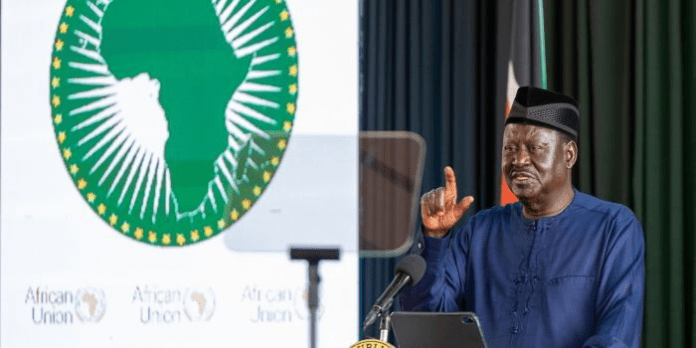

The government spent over half a billion shillings on Raila Odinga’s unsuccessful bid for the African Union Commission (AUC) chairmanship, according to new submissions presented to Parliament.
On Monday, the Defence, Intelligence, and Foreign Relations Committee revealed that the National Treasury approved an expenditure of Ksh523.85 million under Article 223 of the Constitution to facilitate Kenya’s campaign for the position.
Committee Chairperson Nelson Koech informed the National Assembly’s Liaison Committee that the funds were used to cover expenses such as aircraft charters, accommodation, airport transfers, and campaign publicity efforts.
“The committee approves spending of Sh523.84 million for the State Department for Defence, Intelligence, and Foreign Affairs that was incurred in accordance with Article 223 of the Constitution,” Koech stated while addressing the committee, which is chaired by Deputy Speaker Gladys Boss.
Article 223 allows the government to withdraw funds from the Consolidated Fund Services (CFS) without prior approval from Parliament. However, such withdrawals must not exceed ten percent of the approved budget for that financial year and must be regularized within two months.
The Liaison Committee is currently reviewing recommendations from various parliamentary committees regarding the Sh199 billion Supplementary Budget II for the 2024/25 financial year. The deliberations are taking place at Trade Mark Hotel as the Budget and Appropriations Committee (BAC) is yet to be constituted.
Koech clarified that the funds were allocated to support Kenya’s international candidature efforts, specifically for Odinga’s AUC campaign.
“The funds were utilised for Africa Union Chairmanship campaigns (chartered aircraft hire, hotel accommodation, airport transfers, and publicity and awareness creation),” he added.
These disclosures come amid widespread speculation regarding the total cost of Odinga’s campaign. Juja MP George Koimbori had previously alleged that the government spent Ksh13 billion on the bid, a claim that was dismissed by both government officials and Odinga himself.
Koimbori was later arrested, but instead of facing charges related to his statements on campaign funding, he was charged with forging academic documents.
Odinga was defeated by Djibouti’s Foreign Affairs Minister Mohamoud Ali Youssouf, who secured thirty-three votes to win the seat. The former Kenyan prime minister withdrew from the contest after the sixth round of voting, where he managed twenty-two votes against Youssouf’s twenty-six. Madagascar’s former Foreign Minister Richard James Randriamandrato had been eliminated in the earlier rounds.
Following his defeat, Odinga suggested that unexpected factors had influenced the election outcome.
“We were sure we would win. But as I say, other factors have come into play,” he remarked.
Despite the loss, Odinga’s bid had received full backing from President William Ruto and the government, including support from the Ministry of Foreign Affairs and a dedicated campaign secretariat.
After the election, Odinga and President Ruto formalized a political arrangement between Kenya Kwanza and ODM through a memorandum of understanding signed on March 7 at the Kenyatta International Convention Centre (KICC).
The agreement outlines a ten-point plan that includes; Full implementation of the National Dialogue Committee (Nadco) report, Equitable budget allocations, Strengthening devolution, Youth economic empowerment, and Upholding integrity in leadership
Other key areas covered in the agreement include ensuring the right to peaceful assembly, compensating victims of past rights violations, auditing national debt, and intensifying the fight against corruption. Additionally, it seeks to curb wasteful government spending, uphold Kenya’s sovereignty, end abductions, ensure adherence to the rule of law, and protect press freedom.






